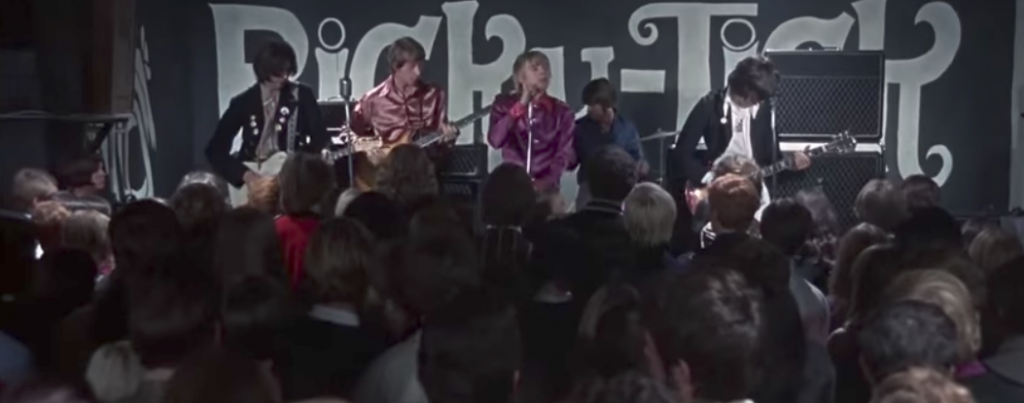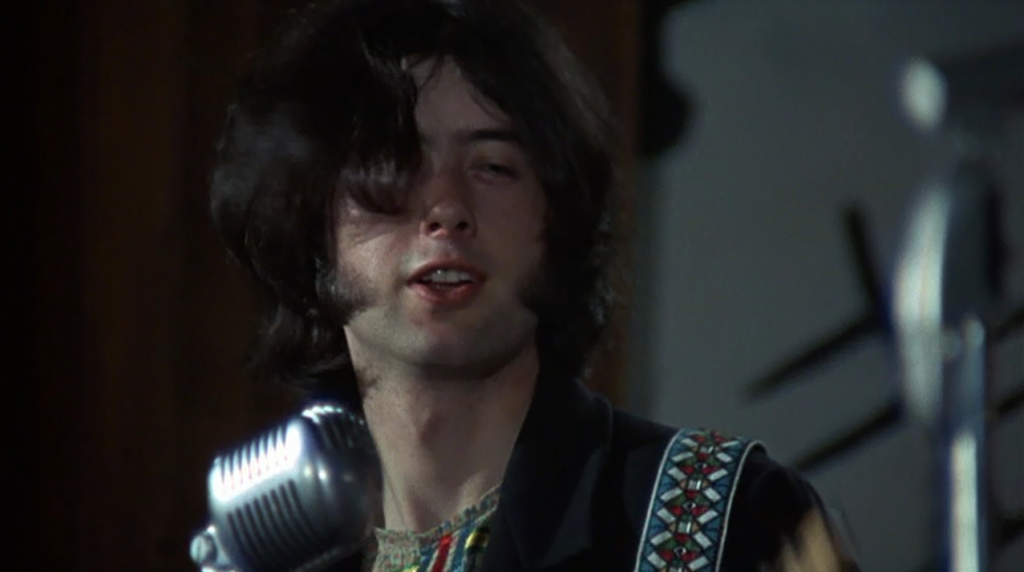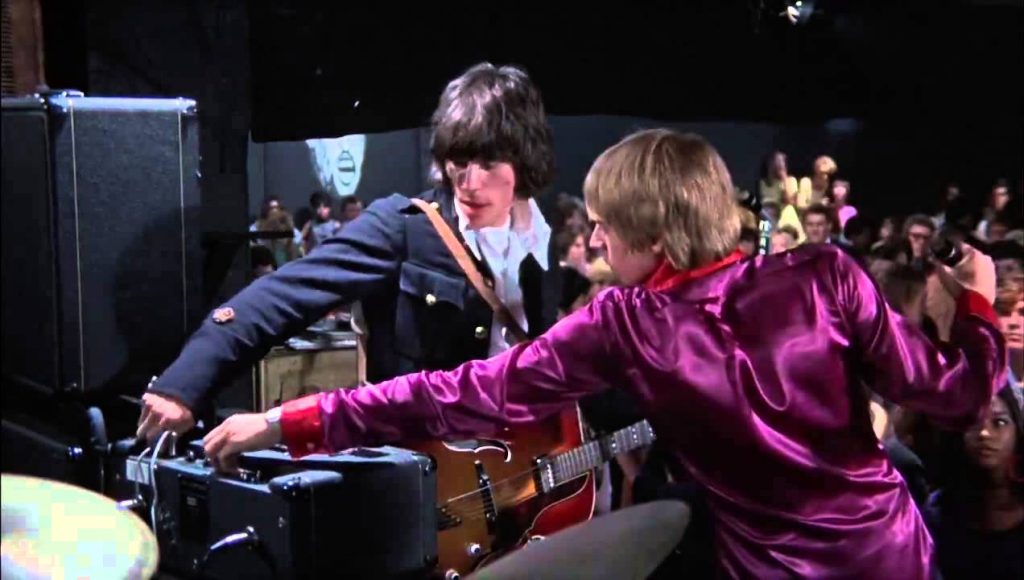
You hear the band before you see it. The scene—one of the most fondly remembered and often discussed in Michelangelo Antonioni’s 1966 British Mod classic Blow-Up—is roughly five minutes in length. It begins when lead actor David Hemmings, thinking he’s seen someone he is searching for (Vanessa Redgrave, actually), parks his car, gets out and sprints in her direction. She’s disappeared, if she was ever there at all—a common occurrence at the core of the film’s underlying message—but something commands him to make his way in another direction, turning down an alleyway, still moving at a clip.
The muffled fuzz guitar and driving boogie-blues beat, progressively louder, draws Hemmings’ character, a photographer named Thomas, into a rock music club, the Ricky-Tick. (Quick-eyed observers will notice a flyer on the club’s door that says, “Here lies Bob Dylan, Passed Away Royal Albert Hall 27 May, 1966 R.I.P.”) We see the audience, from the side at first—bored out of their minds, all of them, standing stock still, expressionless, the music having no noticeable impact on the lot of them. Don’t they know that this is The Yardbirds, one of the greatest bands to emerge from the incredibly fertile British Invasion?!
Thomas is not a rock fan. Although his profession affords him the presumed luxury of being constantly surrounded by fashionable, nubile young women (to whom he is alternately indifferent and unkind, more excited about finding a propeller in an antique shop than bedding “birds”), he is more of a jazzer. The film’s score, in fact, is by a young American keyboardist credited as Herbert Hancock—we know him better now as Herbie—and rock is heard only briefly, earlier in the film. It’s not until the famous Yardbirds scene, about two-thirds in, that we get a full blast of the music that was dominating Britain at the time.

The band members, when we first view them, are so young and “now.” Up front, in striking purple and red, his head topped with your basic blond mid-’60s bangs, is singer Keith Relf. To his right we see drummer Jim McCarty for a moment and, sporting a stylish black jacket and white shirt, the one and only Jeff Beck. To Relf’s left are two more guitar players, Chris Dreja and the former session man named Jimmy Page. (Rock historians have noted that this particular lineup, featuring both Beck and Page, who joined when bassist Paul Samwell-Smith left, was a short-lived one indeed.)
Related: Digging in to the Yardbirds’ history
They’re rocking hard, the quintet, playing a song they call “Stroll On,” but which is—make no mistake—a thinly disguised rip of “The Train Kept A-Rollin’,” a 1951 composition by R&B artist Tiny Bradshaw, whose arrangement was later covered by the American band the Rock and Roll Trio, fronted by Johnny Burnette.
Thomas has even less interest in the music than the other audience members, but he’s always fascinated by the unusual and things gone awry so he begins to notice that a crackling static sound emerging from Beck’s faulty amplifier is increasingly irritating the guitarist. Thomas moves up in the crowd and takes his place closer to the stage as Beck, despite attempts of help from Relf and a roadie, finally gets fed up, smacks the neck of his guitar into the malfunctioning amp and, ultimately, bashes his axe into pieces on the floor of the stage.

Beck stomps on it, picks up the dislodged neck and tosses it into the crowd. Guess who ends up with it?
More on that in a minute.
First, as you might’ve guessed, there’s a story behind the story. Antonioni—who was nominated for Best Director and Best Original Screenplay for the critically lauded Blow-Up, the Italian’s first English-language film—had reportedly hoped to land the Who, already known around London for Pete Townshend’s guitar-smashing antics, but apparently they would have strained his thin budget. Rumors that both the Animals and Americans the Velvet Underground were also considered have been floated over the years.
As it turned out, an obscure band called the In Crowd, featuring future Yes mainstay Steve Howe, was initially tapped for the part, but they became the out crowd once the more popular Yardbirds became available. Several knockoffs of Gibson ES-175 guitars were created for the scene and it’s one of those that met its untimely doom in the film.
Back to the scene: Beck tosses the broken neck into the still-bored audience and…well, we don’t want to spoil it in case it’s your first time.
Our Classic Video…
Blow-Up, released on Dec. 18, 1966, in the U.S. and March 16, 1967, in the U.K., cost a reported $1.8 million to make. It ended up with a worldwide box-office take of $20 million.
Related: Making sense of the Yardbirds’ album releases
- Over Under Sideways Down: Making Sense of the Yardbirds’ Album Releases - 05/27/2024
- 17 Classic Chuck Berry Covers - 05/18/2024
- ‘Brandy’ by Looking Glass (It’s a Fine Song) - 05/18/2024


4 Comments
I wrote about this for BestClassicBands too.
The first so-called “Super Group”
Eric Clapton was also a member, playing with J.Beck & J. Page!
But not all at the same time.
And here I am, but …. I seem to recognize the place, it will not be the marquee of Wardour St. ??